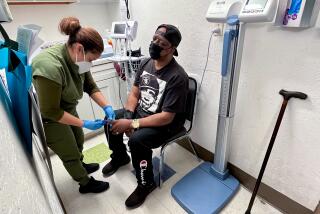2 Hearts That Beat as 1 : Health: Two West Hills teen-age brothers have pacemakers. Their concern for one another and good nature help them cope.
- Share via
WEST HILLS — Many brothers spend their teen years at each other’s throats, but not 16-year-old Dustin Petok and his 19-year-old sibling, Josh. They enjoy each other’s company, make home movies together and often team up to play jazz, Dustin on piano and Josh on guitar.
There is something else unusual about the West Hills residents: Both have pacemakers.
In fact, the Petoks may be the only teen-age brothers in the U. S. who have the heart-stimulation devices. They kiddingly refer to themselves as “the Pace Brothers.”
And in another twist to their story, cardiac experts believe that the youths’ problems probably are not hereditary.
Both Petoks received pacemakers to correct a condition known as sick-sinus syndrome, caused by a defective sinoatrial node. That node--the heart’s natural pacemaker--sends electrical impulses that stimulate heartbeats.
Pacemakers are rare among teen-agers, and rarer still among teen-age siblings. According to the National Center for Health Statistics, Americans between ages 15 and 24 received only 213 of the 128,000 pacemakers installed in 1991. (More than 103,000 pacemakers were installed in those 65 and older).
Half a dozen cardiologists and other experts nationwide said they had never heard of teen-age brothers with pacemakers, although they said there were some cases of older siblings with them.
“The last case I heard of like that was two sisters, but they were both in their 60s,” said a spokesman for Medtronics, a Minneapolis, Minn.-based firm that is the nation’s largest pacemaker manufacturer.
Dustin and Josh Petok are bright and articulate. They are close to one another, as well as to their parents and a younger brother, 13-year-old Noel. But the pacemakers have affected their lives in very different ways.
Josh, an acting student at Pierce College in Woodland Hills, received his at age 16 after years of unexplained fainting spells when he was excited or under stress. One episode occurred just after he took his ninth-grade final exams.
During a 1991 blood test at Kaiser Hospital in Woodland Hills, Josh again passed out. A doctor reading an electrocardiogram printout realized that the boy’s heart had stopped--for an agonizing 10 beats. The physician ordered an immediate pacemaker implant.
For Josh, the device is not that big a deal. He is not particularly athletic, and the device has restricted him little. He even likes to show off his incision to acquaintances.
“I hardly even notice it’s there,” he said. “It just becomes another part of your life. Maybe sometimes when I’m sleeping I feel it working. But that’s about it.”
But for Dustin--known to his family as Dusty--the pacemaker represents a serious disruption of life.
A slight but wiry-looking boy with a shy grin, Dusty was a two-sport athlete at Calabasas High School until last month, when he received his pacemaker. In junior high school, he got an award for outstanding athletic achievement.
He had played wide receiver on the Calabasas High football team but was told by his doctors to drop contact sports. He also is on the school track team and may be able to continue sprinting and pole-vaulting, depending on the outcome of treadmill tests that he is scheduled to take.
“It was sort of hard for me to deal with,” he said, sitting in his living room with Josh, Noel and their mother, Ellen, a lactation consultant.
“While I was in the hospital, it was pretty much one of the only things I was thinking about. If I got hit, the pacemaker could be dislodged.”
“It wasn’t really a choice for me. . . . It’s really a choice between life and death. Because if I didn’t have a pacemaker, then it could be the next time I passed out, or it could be the 100th time that I pass out. You never know,” he said.
Last summer--little more than a year after Josh got his pacemaker--Dusty passed out during a football practice. Last month, he experienced dizziness while scoring a youth basketball game that his father, Edward, was coaching.
Taken to Kaiser, Dusty passed out as doctors tested his heart rate. His blood pressure and heartbeat dropped alarmingly.
“He was white,” said Ellen Petok. “He was just laying there. And I was becoming hysterical.” Hospital personnel rolled in a “crash cart” loaded with emergency gear and prepared high-voltage electric paddles in case Dusty’s heart stopped.
A cardiologist told Dusty’s parents that he needed a pacemaker immediately. On the spot, the doctor installed a temporary one--running a wire through an artery in Dusty’s leg into his heart. The next day, a permanent device was installed.
Dr. Jeanie Woo, Dusty’s cardiologist, said she does not think that his heart problem is hereditary, because it did not show up earlier in his life.
But Ellen Petok is not convinced, and is concerned about her youngest boy, Noel. Already, he has undergone an electrocardiogram and is scheduled for other heart tests.
“Parents oftentimes just discount it when kids faint,” she said. “And I think it’s important to make sure it’s checked out properly. I don’t think that every kid that faints needs a pacemaker . . . but I don’t think it should go unnoticed.”
In the meantime, her boys go on with their lives, playing music and making home movies together.
“I think this is something that just makes us closer,” said Josh Petok, glancing at Dusty.
“When I went into the hospital to visit him, I knew exactly what he was going through.”
More to Read
Sign up for Essential California
The most important California stories and recommendations in your inbox every morning.
You may occasionally receive promotional content from the Los Angeles Times.













